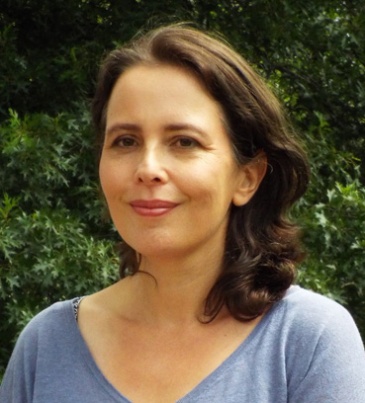
Best-selling author Megan Goldin.
Megan Goldin’s debut novel The Girl in Kellers Way (Penguin) is domestic noir of the highest order, and has been greeted with the popular and critical acclaim it so richly deserves. Psychology and the ephemeral nature of memory are among the themes the former foreign correspondent explores in this tight, gripping story inspired by Daphne du Maurier’s timeless gothic thriller Rebecca.
In Megan’s story, lonely and troubled housewife Julie West may be able to lead police to the killer of a woman whose body is found on a desolate forest road, where Julie often jogs. Numbed and deluded by her tedious suburban life and the mind-altering medication she is forced to take, Julie’s account of current and past events is unreliable at best and devious at worst. Her husband Matt, a psychology lecturer specialising in the inaccuracies and inconsistencies of memory, may be an innocent man still mourning the death of his first wife, or a malicious, Machiavellian killer intent on concealing the truth.
Narrated in the first person from Julie and Mel’s alternating points of view, the novel is riveting from the first chapters, when the revelation of the identity of the dead woman raises more questions than it answers. The taut, fast-paced narrative raises questions about trust, truth, infidelity and the manipulation of memory and, as a thriller should be, it’s very difficult to put down.
Before publishing The Girl in Kellers Way, Megan had been a correspondent for the Reuters news agency, a producer for the ABC and a senior editor with Yahoo! News in the Middle East and Asia. I was delighted to have the opportunity to interview her for The West Australian not long after the book was released, and even more delighted when she agreed to be a guest on Shelf Aware. I think you’ll find her responses to my ten questions as fascinating as I did. I am in awe of her disciplined approach to writing.
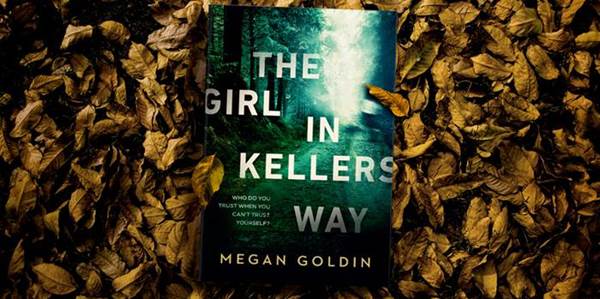
Q. Megan, how would you describe the work that you do and how you do it?
A. I am a storyteller and a wordsmith who creates imaginary worlds and characters that take on a life of their own in my readers imaginations.
You can’t write without reading so I read voraciously and listen to podcasts on everything from current affairs, to crime, to the arts and history. Writing novels is lonely and isolating work. I find the podcasts are very helpful in stimulating my imagination, giving me ideas and generally connecting me with the outside world when I take long walks during breaks from writing.
I try to work from about 10am to 3pm while my kids are at school. At night, I usually write from 10pm until I get too sleepy to keep writing. School holidays are the toughest time for me to write as there’s no time to write during the day and my kids insist on going to sleep late at night which cuts into my writing time. We have a small house and I can’t concentrate with disruptions at night. Since I’m often driving my kids to various sports training programs, I carry my laptop with me and write in the car or on the benches in the stadium. I’ll often write in the car while waiting to pick the kids up from school. Writing in the car has certain advantages because there’s no Internet connection so I can’t procrastinate. In winter at least it’s sometimes warmer in the car than in my house!
Q. What projects are you currently working on, or do you have in the pipeline?
A. I have just finished the first draft of the manuscript for my second novel which is more of a corporate noir thriller than the domestic noir thriller of my first novel The Girl In Kellers Way. I have a pretty good idea for the plots of my next two books as well as other books that I’d like to write. All I really need now is time and hopefully enough income to enable me to dedicate myself to writing.
Q. Where are the main bookcases in your home or office? Do you also keep books in other places at home (or elsewhere)?
A. We have bookcases in most rooms in the house scattered with books. I’ve moved countries frequently over the past few years so I don’t have an extensive book collection. Also, I lived in Singapore and the tropical climate and high humidity is terrible for books so I had to throw out a lot of mouldy books when I left Singapore.
My book collection is not extensive. Certainly not compared to some of the authors who have participated in Shelf Aware. I find that I keep certain books that I loved and like to reread every now and again as well as history books that I pick up and read when the mood strikes me. I find it hardest to give away books that I’ve read to my kids as well as books from my childhood. There was one particular book from my childhood that I’d never forgotten though I couldn’t remember the name. I recently searched for it and found the name and a second hand copy. It’s called Tubby and the Lantern. I bought it and read it to my youngest son. I think I enjoyed it more than he did.
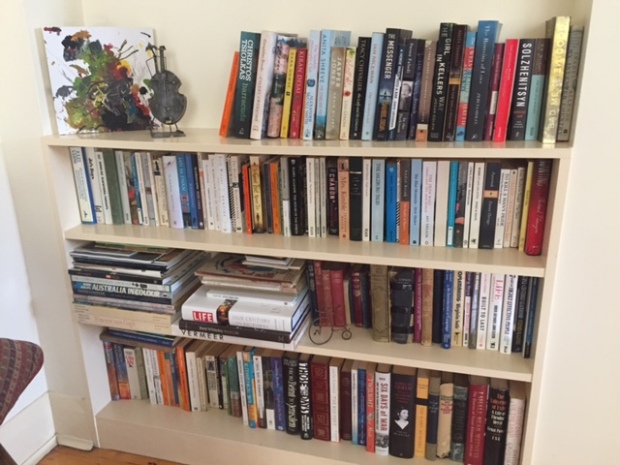
Q. How are your books organised/arranged?
A. There’s no rhythm nor reason in the way that my books are arranged. I generally have the kids books in the kids rooms. The recipe books are near the kitchen. The rest are scattered across bookshelves in different rooms of the house with fiction and non-fiction all mixed together. Perhaps if I had a bigger book collection then I’d have to organise them better. Though I have to say there’s a lot to be said for serendipity when it comes to choosing books.
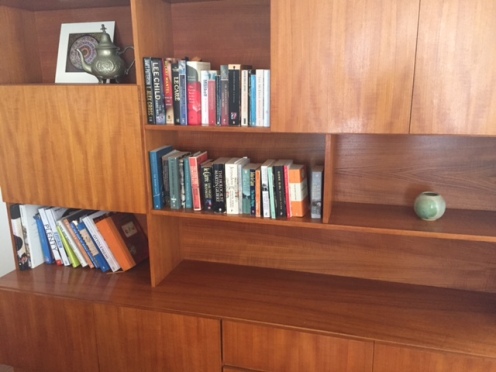 Q. What sorts of books predominate?
Q. What sorts of books predominate?
A. I have mostly novels and history reference books. I am a great reader of history and these are often the books that I kept when I moved countries.
Q. Describe your favourite reading place.
A. I love reading in the sunshine during the warmer months, often sitting on my porch or lying on the grass in my garden. In winter, I tend to read in our front room which gets morning sun. Or of course in bed on a cold Melbourne winter night.
Q. What book/s are you reading right now? Why did you choose that book/those books and what do you think of it/them so far?
A. I have gone on a reading binge after handing in my manuscript for my second novel. I read a heap of literary fiction as well as commercial fiction that piled up while I was too busy writing to read regularly. One of my favourites is A Horse Walks Into A Bar, which just won the Man Booker International Prize. It’s sublime. I am just about to read A Legacy of Spies. John Le Carre’s latest work. I heard him do a reading in a podcast and couldn’t wait to get hold of the novel. I’ve also been reading Hemingway’s The Old Man and the Sea to my sons. I also have a pile of crime novels that I am planning to read over the school holidays.
Q. What are your favourite books and/or who are your favourite authors?
A. I have so many. I very much enjoy Ian McEwan’s works. Atonement is one of my favourite books. David Grossman and Meir Shalev are two remarkable Israeli writers whose works I greatly enjoy. Also, I’m a huge fan of the American writer Pat Conroy.
Steinbeck’s East of Eden is a favourite novel that I’ve read many times. Not to mention his other works. I adore Robert Grave’s I, Claudius. Another favourite is Daphne du Maurier. I read all her books as a teenager and reread most of them as an adult. Her novel Rebecca was an inspiration behind The Girl In Kellers Way. I love The Catcher in the Rye and couldn’t wait to buy it for my teenage son so I’d have an excuse to read it again. I reread Jane Austen’s works every now and again because I always enjoy them. Thomas Keneally and Richard Flanagan are among a long list of Australian writers whose novels I adore.
In terms of commercial fiction, at the moment, I am very much enjoying Michael Connelly and of course Lee Child who spoke at the Sydney Crime Writers Festival where I recently participated on several panels.
Q. In the event of an emergency, if you could save just three books from your collection, which books would they be – and why would you choose them?
A. It would have to be those rare books that can never be replaced. They would include Seven Pillars of Wisdom, by T.S. Lawrence, as I have a 2nd edition copy. A copy of Mila 18, by Leon Uris, as it has an inscription to my grandfather from my grandmother who gave it to him as a gift in the early 1960s. And lastly, I would save the first proof copy of my own book The Girl In Kellers Way. It was remarkable to finally see my novel in print when I was first handed that copy. I am not sure if people realise how gruelling it is to write a book and get it ready for publication. It was an amazing feeling to finally hold the finished product in my hands. It as a bit like reaching the summit of my own Everest.
Q. If you could sit down for afternoon tea with your three favourite characters or authors, who would they be, what would you serve them, and what would like to talk to them about?
A. This is a very tough question because there are so many authors and book characters that I’d love to meet. Not to mention the subjects of biographies such as Churchill, Napoleon, Da Vinci and Julius Caesar.
If pressed, I’d invite Jane Austen, Mark Twain and William Shakespeare. I’d serve sushi and sashimi because it would be amusing to watch them grapple with chopsticks and the concept of eating raw fish. Perhaps I’d bring in mugs of hot chocolate and cheesecake to sweeten them up afterwards. I think they’d all be hilariously mismatched and the conversation would go in all sorts of directions. It would be a thoroughly entertaining afternoon.
Megan’s social media links:
Website: megangoldin.com
Twitter: @megangoldin
You can buy The Girl in Kellers Way here or here.

























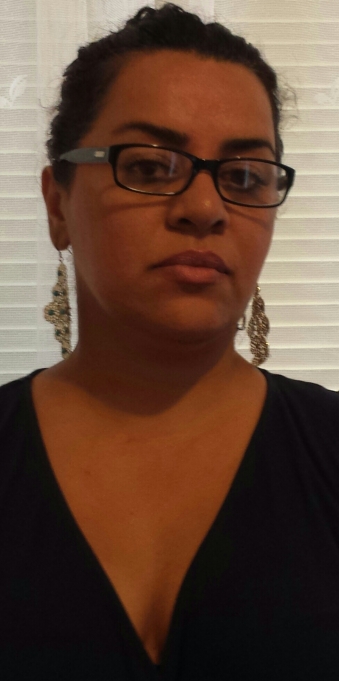

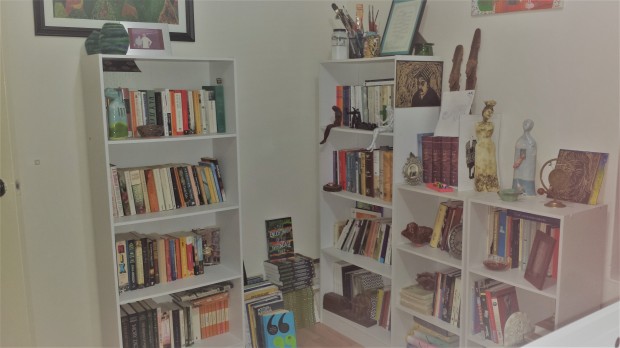 Anyway, after that I start to buy more books here. Even I bought some books that I had in my previous library at Iran. I expend lots of money to buy them from Iranian publishers or bookshops out of Iran. The price of postage sometimes are more than books. Now I have only about 400 books. All in my writing room.
Anyway, after that I start to buy more books here. Even I bought some books that I had in my previous library at Iran. I expend lots of money to buy them from Iranian publishers or bookshops out of Iran. The price of postage sometimes are more than books. Now I have only about 400 books. All in my writing room.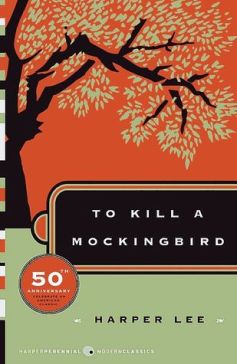
















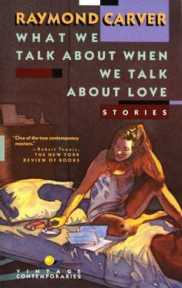
































 Q. Describe your favourite reading place.
Q. Describe your favourite reading place.














 My partner and I start young horses under saddle and retrain difficult ones using an evidence based approach. We coach, give demos and I also lecture in horse behaviour at university. Last year we published a book about horse training called,
My partner and I start young horses under saddle and retrain difficult ones using an evidence based approach. We coach, give demos and I also lecture in horse behaviour at university. Last year we published a book about horse training called, 



 I also keep my favourite children’s books together. I couldn’t face the thought of giving away books like, Guess How Much I Love You. I read that book to my three children so many times that I think I can recite it all without looking at the text.
I also keep my favourite children’s books together. I couldn’t face the thought of giving away books like, Guess How Much I Love You. I read that book to my three children so many times that I think I can recite it all without looking at the text.


















